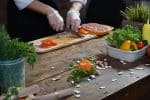In everything we do, safety is always the top priority. Whether going to school or work, people must be aware of the safety policies within the building and within the organisation. In regards to safety, cooking is no exception.
You don’t need to become the best cook in the neighbourhood or the world to know how important knowing and practising safety in the kitchen during meal preparation. Unfortunately, these aspects of cooking are often left taken for granted. Cooking safety is crucial in different aspects of the meal preparation. This includes food preparation, cooking, and cleans up, and proper food storage.
Taking the time to understand the possible hazards in cooking can help you avoid accidents and cases of food poisoning. Experts always remind everyone that food poisoning is dangerous and life-threatening when unknowingly left unchecked.
What is Food Poisoning?
Food poisoning, which is also known as foodborne illness, is a range of sicknesses that is caused by eating or drinking contaminated, spoiled or toxic food or drink. Its common symptoms include nausea, vomiting, and diarrhoea.
Its symptoms are both ends of the spectrum — it can make a person affected feel uncomfortable and unpleasant, and it can be fatal.
In a nutshell, there are many types of food poisoning, and among the common types are:
- Bacterial — this includes Salmonella, Campylobacter, E.coli, and Listeria
- Viral — this includes Norovirus, Rotavirus, and Hepatitis A
- Intoxication from toxins produced by specific bugs — this includes Staphylococcus aureus, Bacillus cereus, and Clostridium perfringens
How to prevent it?
As the saying goes:” Prevention is better than cure.” First things first, doing the basic precautions such as placing frozen raw meat under running water instead of leaving it in the sink to defrost may look like a chore, but once you get to know the basics of food safety, it will feel like second-nature and this will help you prepare food with confidence.
Whether cooking for your family or friends, practising these cooking safety tips are important to follow and make a habit.
Kitchen Sanitation
- Before preparing anything on the kitchen counter or eating any meal, make sure to wash and dry hands thoroughly
- Always clean and keep dry benches, kitchen equipment, and tableware
- Avoid raw meat juice to drip on other food ingredients
- Don’t forget to separate raw and cooked food
- Use different cutting boards and knives for raw and cooked food
- Avoid cooking, especially if it’s for others, when affected with diarrhoea and other illnesses
For Cold Food
- Don’t let the fridge temperature go beyond 5°C
- Store food that needs to be in the fridge immediately
- Avoid eating food that was stored outside of the fridge for more than two hours when it should be stored in the fridge immediately
- Always marinate and defrost outside the fridge
- Use a cooler bag when shopping for meat or fish
- Use an esky when going to a picnic
For Hot Food
- When cooking, don’t go below 60°C, and make it hotter if needed for certain dishes
- When reheating, also heat it at least 60°C, and then wait for it to become steaming hot
- When cooking meat, make sure not to leave any pink spots, which are areas that are uncooked.
- When serving chicken, make sure that the chicken is free of water from its defrosting.
- When boiling marinades, make sure to boil marinades containing raw meat juices to boiling point before serving
For Food Labels
- Don’t eat food that is over the written ‘use-by’ date on the packaging
- Always label or remind yourself of the best before’ date
- Be firm in following storage and cooking instructions
- Be aware of possible allergies when buying packaged or unpackaged food
- Always ask information when buying unpackaged food
Cooking good food is not restricted to fresh ingredients and amazing cooking techniques. Cooking is a discipline; and when it comes to safety, you should know the dos and don’ts. When you want to work as a commercial cook someday, understanding the right process and techniques in picking, handling, and cooking food through a commercial cookery course in Melbourne is a great start to the journey. These courses are targeted to inspire chefs-to-be in starting their culinary journey and transform their love of food into a lifelong career.
For enquiries, contact MCIE today: Call: 1300 737 004 during Monday to Friday at 9:00am to 5:00pm or Email: email info@mcie.edu.au or visit the Contact Us Page: https://www.mcie.edu.au/contact/




